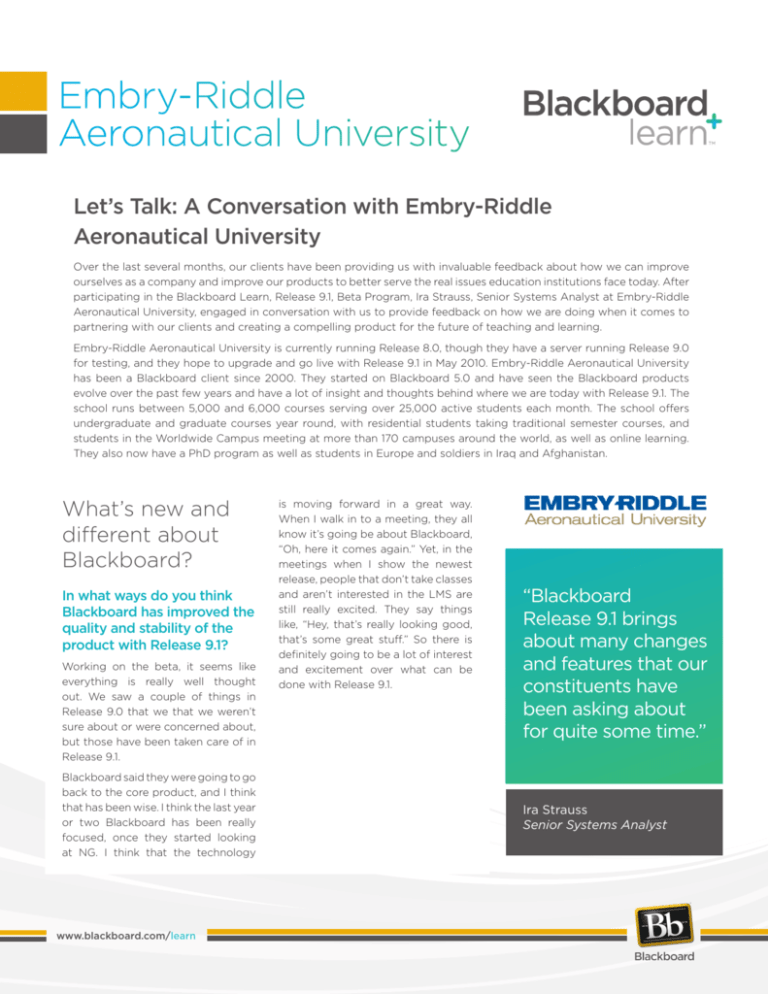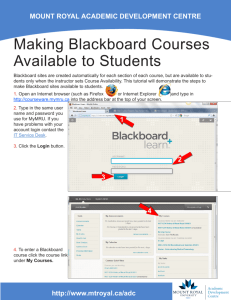
Embry-Riddle
Aeronautical University
Let’s Talk: A Conversation with Embry-Riddle
Aeronautical University
Over the last several months, our clients have been providing us with invaluable feedback about how we can improve
ourselves as a company and improve our products to better serve the real issues education institutions face today. After
participating in the Blackboard Learn, Release 9.1, Beta Program, Ira Strauss, Senior Systems Analyst at Embry-Riddle
Aeronautical University, engaged in conversation with us to provide feedback on how we are doing when it comes to
partnering with our clients and creating a compelling product for the future of teaching and learning.
Embry-Riddle Aeronautical University is currently running Release 8.0, though they have a server running Release 9.0
for testing, and they hope to upgrade and go live with Release 9.1 in May 2010. Embry-Riddle Aeronautical University
has been a Blackboard client since 2000. They started on Blackboard 5.0 and have seen the Blackboard products
evolve over the past few years and have a lot of insight and thoughts behind where we are today with Release 9.1. The
school runs between 5,000 and 6,000 courses serving over 25,000 active students each month. The school offers
undergraduate and graduate courses year round, with residential students taking traditional semester courses, and
students in the Worldwide Campus meeting at more than 170 campuses around the world, as well as online learning.
They also now have a PhD program as well as students in Europe and soldiers in Iraq and Afghanistan.
What’s new and
different about
Blackboard?
In what ways do you think
Blackboard has improved the
quality and stability of the
product with Release 9.1?
Working on the beta, it seems like
everything is really well thought
out. We saw a couple of things in
Release 9.0 that we that we weren’t
sure about or were concerned about,
but those have been taken care of in
Release 9.1.
Blackboard said they were going to go
back to the core product, and I think
that has been wise. I think the last year
or two Blackboard has been really
focused, once they started looking
at NG. I think that the technology
www.blackboard.com/learn
is moving forward in a great way.
When I walk in to a meeting, they all
know it’s going be about Blackboard,
“Oh, here it comes again.” Yet, in the
meetings when I show the newest
release, people that don’t take classes
and aren’t interested in the LMS are
still really excited. They say things
like, “Hey, that’s really looking good,
that’s some great stuff.” So there is
definitely going to be a lot of interest
and excitement over what can be
done with Release 9.1.
“Blackboard
Release 9.1 brings
about many changes
and features that our
constituents have
been asking about
for quite some time.”
Ira Strauss
Senior Systems Analyst
How do you get your faculty prepared for
each new release?
I’m very pleased with the materials that Blackboard is
coming out with—the getting started documents, the flash
videos—they are beginning to fill what’s been a big void and
difficult for us to take care of.
Our ability to produce documentation and make movies has
actually slowed down rather than gotten better – we’ve lost
resources. So, Blackboard’s coming forward with all these
new resources just in time. Communication to stakeholders
is really important, and it’s great that we’ll have all of the
Blackboard documentation available through our portal.
We’re going to have the On-Demand Learning Center pushed
up front and center in Blackboard. We’re going to use our self
help knowledge base to really set up a lot of questions and
answers—things like how do I add a grade column, how do I
create an assignment, how do I add content? We’ll make some
quick comments and point to the Blackboard resources from
there. So, all of the client tools that Blackboard has developed
will save us time and energy, making our jobs easier.
What new capabilities about
Release 9.1 are really exciting?
With your history working with previous
releases, and from what you’ve seen of
Release 9.1 in the Beta Program, what are
some of the key features of Release 9.1
that are getting people really excited?
We are most excited with the move to the drag and drop user
interface; that’s excellent. Also, some of the new content is
going to be exciting. I think probably the biggest thing would
be the Mashups or the Wikis.
We’re getting ready to go into accreditation, and we have a
whole new group working on hybrid course design. They are
hoping to bring in hybrid course design as part of what they
call the QEP, which stands for Quality Enhancement Plan.
So, they are very excited about wikis, for that purpose. Also,
content wise, some of the audio and the video and the way
those can be easily embedded in a course are going to be lot
more exciting than what we’ve been doing.
How do you see mashups, wikis, and blogs
being integrated into the daily teaching
experience?
In addition to our web-facilitated worldwide online courses,
we have thousands of courses in the residential campus and
in the ground centers which are all over the world. We’d really
like to move some of those courses to the hybrid setup where
instead of meeting three times a week, they meet one time
a week. The whole goal of the hybrid courses is to reduce
the amount of time spent on the ground with activities that
can be accomplished with an asynchronous type of event
online. Instead, when they do meet face-to-face, it becomes
a chance to really have a conversation about the course
material or have a lab. So, features like wikis and blogs, where
the students can be guided by the instructor in their own
exploration, and the ability to present to each other through
audio or video and make presentations with the mashups
from YouTube are all very appealing.
You’ve obviously seen very different
versions come out over the past ten years,
so what would you tell another institution
that is thinking of upgrading to Release 9.1?
I would tell anybody that was not on Project NG that
they really should be looking at making that move. It will
take communication and training, but it’s going to be a
tremendous shift for their faculty in terms of what control
they have and what they will be able to do.
I think one of the best aspects of Release 9.1 is the
intuitiveness. I’ve been telling a lot of our faculty and staff
that if they just take a minute, they can find anything that
you’ve been using in the past. Don’t be concerned that you
don’t see it right away. If you can get them to open the door
and look in, they are going to be really amazed at how easy
it is and how intuitive it is, especially things like setting up
the course—it’s just a blast compared to the past when you
had to go to a control panel and click “OK” fifteen times for
every single action.
One final thought: where do you see the
future of course management technology
going and how is Blackboard shaping up
to meet those needs?
I think as I mentioned, the biggest thing is that Blackboard
maintains the focus on teaching and learning. I know where
we’re going at Embry-Riddle Aeronautical University is
Outcomes and the overall institutional assessment. We’ve
got to see more and more tie in between institutional
goals and the individual courses. I know the Outcomes
team is trying to go that way; it’s the next big thing for
us. We’re bringing Outcomes in for assessment and we’re
bringing it in for departmental planning and program
assessment. For example, we want to be able to be to go
in and judge how all the physics classes are being taught
across three campuses. That sort of data collection, we
can only do with Outcomes, and we need to keep seeing
Outcomes developing. Its ability to get into the courses
and the courses’ ability to deliver content and results to
Outcomes—that’s the biggest area for us right now and
where I see other institutions headed.
www.blackboard.com/learn
650 Massachusetts Avenue, NW 6th Floor
Washington, DC 20001
1-800-424-9299, ext. 4
Copyright © 2010. Blackboard Inc. All rights reserved.
Blackboard and the Blackboard logo are registered
trademarks of Blackboard Inc.



